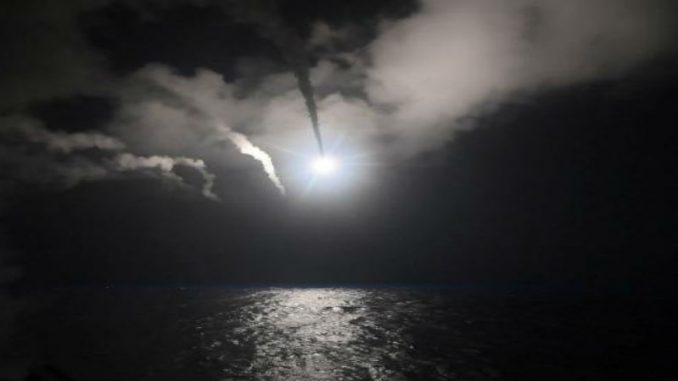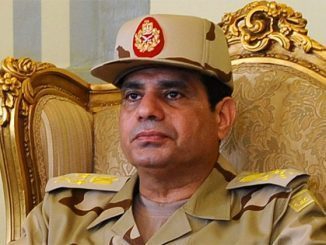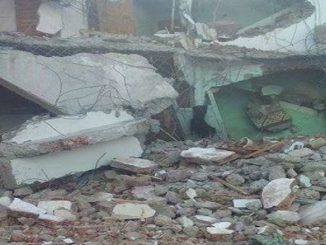
In the early hours of Friday morning, US President Trump authorized the launch of cruise missiles on a Syrian airbase which was behind this week’s chemical weapons attack, which is considered a new development on the Syrian crisis.
In abrupt shift on Syria, the United States has fired dozens of cruises missile strikes at al-Assad’s regime’s airbase in Syria hours after a poison attack that killed dozens of civilians on Tuesday.
More than 60 civilians were killed in Syria in a new chemical attack that was carried out by Assad regime’s air force on the rebel-held Idlib province, doctors and monitoring groups have said, in a new chapter of Assad regime’s massacres using prohibited weapons.
US President Donald Trump’s intelligence advisers provided evidence that Syrian leader Bashar al-Assad was behind the atrocity, officials said.
Trump, who had long said the top U.S. priority in Syria should be to fight Islamic State, immediately ordered a list of options to punish Assad, according to senior officials who took part in the flurry of closed-door meetings that played out over two days.
At that time of the U.S airstrikes, Abdel Fatah al-Sisi of Egypt was on his way back from his first official visit to the United States of America, seeking to revive the strategic partnership between Cairo and Washington.
Signs of strengthening ties between both countries and Trump’s unwavering support to al-Sisi was obvious as both leaders have much in common.
In this context, the Al-Sisi regime did not issue any official statement on the U.S airstrikes against al-Assad’s airbase. So, it seems that the coming days will witness changes in alliances and new political maneuvers regrading many issues in the Middle East.
Al-Sisi used to back al-Assad’s regime
Since al-Sisi reached power in a military coup in 2013 against Egypt’s first democratically elected President Mohamed Morsi, he has backed Bashar al-Assad’s regime in various international occasions.
Last October, Egypt voted in favor of the Russian-backed draft resolution on Aleppo in the United Nations security council.
The Russian draft resolution which was submitted as a counter measure was opposed by Western and Gulf countries, especially Saudi Arabia.
As a result, Egypt’s vote led to an unprecedented rift between Egypt and its strongest Arab ally, Saudi Arabia.
The vote triggered the first public condemnation by the Saudis of the Egyptian regime, which they helped bring to power three years ago.
The Saudi criticism also coincided with cutting monthly discounted oil shipments to Egypt, a much-needed support for the country’s deteriorating economy.
Moreover, Abdel Fattah Al-Sisi had said during an interview with the Portuguese TV in November that Egypt supports the Syrian Arab Army which was considered as an explicit support to the Syrian regime.
Last November, Abdel Fattah al-Sisi admitted that Cairo’s priority “is to support national armies, for example in Libya,” as he told Portuguese state television. “The same with Syria and Iraq.” The host then pressed Sisi over whether he meant the Syrian regime. “Yes,” Sisi replied plainly.
Accordingly, there were signs of al-Sisi’s regime rapprochement towards the Russian axis in an unprecedented way.
In addition, Egypt again aligned itself with the Russian axis regarding the Syrian file as it abstained from voting on UN Security Council resolution to introduce new sanctions on Syria.
The Security Council draft resolution aimed to ban the supply of helicopters to the Syrian government and impose sanctions on Syrian military and security officials and entities within Bashar al-Assad’s government over accusations that they were involved in the use of chemical weapons on civilians.
Egypt’s permanent representative to the United Nations, Amr Abul Atta said that Cairo didn’t support the draft resolution on Damascus as it didn’t include real evidence and it has only submitted unconvincing accusations.
During the UN Security Council session, Atta said that the draft resolution has neglected “the evidence,“he added, “We were surprised that it has jumped the traditional steps followed in the council and it included pre-prepared list of entities and individuals, who were considered by those presented the resolution, as the ones responsible for the use of chemical weapons in Syria.”
He also described the resolution as being “absurd” as it lacks both evidence and proof, according to his words.
Atta also said that the resolution is a “preemptive step to the joint investigation commission reports.”
Russia and China have vetoed a United Nations Security Council draft resolution imposing sanctions on Syria over chemical attacks carried out by Damascus.
Along with Russia and China, Bolivia voted against the draft resolution while Egypt, Kazakhstan and Ethiopia abstained.
At that time, it was obvious that Egypt’s permanent representative comments match the reasons submitted by Russia’s Deputy Permanent Representative to the UN Vladimir Safronkov who also has said after the voting at the UN Security Council,”Despite our consistent appeals, the authors preferred a politically motivated path, leading to confrontation and adding complexity to the situation, including on our Security Council platform.”
The diplomat added, “They headed for deliberately heating up tensions, being well aware from the very start that this initiative has no chances of being approved at the Security Council.”
He said in this situation Russia “had no other choice but to block the passing of this resolution, the sanction list of which is copied from the analogous American list, approved at the start of this year by the previous US administration,” Safronkov said.
Furthermore, in an interview with al-Watan newspaper, last December,Bashar al-Assad of Syria has stressed that the Egyptian-Syrian relations is improving, adding that the relations have been limited only to military cooperation so far.
Al-Assad also stressed that” the cooperation-between both countries- is still limited within the security framework.”
In addition, Al-Safir, a Lebanese newspaper close to the Shiite militant group Hezbollah, revealed that an Egyptian unit, including 18 Egyptian pilots started to work at Hamah military airbase in Syria on November 22.
18 pilots were part of a special helicopter squadron operating at Hamah airbase and have been at the base since 12 November, according to the same source.
It is not known if the pilots have already participated in airstrikes or not, but their presence at Hamah airbase shows that there is an Egyptian-Syrian decision to speed up merging the Egyptian pilots.
Media reports also tracked the Egyptian-Syrian communications and efforts amid a series of undeclared security meetings between Cairo and Damascus, according al-Safir.
Last October, a top Syrian intelligence official discussed security coordination with his Egyptian counterpart amid warming ties between the two countries.
Syria’s state news agency SANA reported then that Syrian National Security Bureau chief Ali Mamlouk “made an official visit to Cairo,” where he met with General Khaled Fawzy, the head of Egypt’s General Intelligence Service, as well as other “senior security officials.”
SANA said “The two sides agreed to coordinate political stances,” adding that they also decided to “strengthen coordination in the fight against terrorism.”
In August 2015 Mamlouk, who has served as a diplomatic troubleshooter for the Bashar al-Assad regime, previously traveled to Egypt in August 2015.
Al-Mamlouk was appointed chief of the Syrian National Security Bureau in 2012. He currently supervises all Syrian security apparatuses. Al-Mamlouk’s name is one of several Syrian names listed by imposed E.U. sanctions.
Al-Sisi in Washington:Obama Left Vacuum For Russia, Middle East Now “Paying The Price”
In an interview with FOX News Channel’s Bret Baier, Abdel Fattah al-Sisi praised US President Trump and talked about the ongoing crisis in Syria.
The military coup leader also said that the “vacuum” left by the Obama administration that was filled by Russia in the Middle East. El-Sisi agreed that Obama enabled Russia to take a greater role in the Middle East and the region is now paying a price.
In fact, al-Sisi was justifying, during the interview, the Egyptian rapprochement with the Russian axis after the Egyptian-American relations deteriorated during Obama administration.
Oren Kessler published an article titled: “Egypt Picks Sides in the Syrian War” that “Cairo’s frayed post-coup ties with the former administration of Barack Obama led it to turn to the Kremlin for everything from helicopters to joint military drills to nuclear power.”
U.S.-Egypt relations soared under the former administration of Barack Obama, which admonished Cairo for its rights abuses following the military overthrow of Egypt’s first democratically elected President Mohammed Morsi.
In 2013, the U.S. suspended military aid to Egypt before resuming it two years later, but Obama never extended an invitation to the Egypt’s military dictator after he assumed office in 2014 amid continued human rights violations.
Moreover, during Obama administration, “The State Department’s human rights report accuses Sisi’s government of stifling basic freedoms and enforcing its repression through torture, the disappearances of critics, and arbitrary arrests and killings.”
However, this isn’t the case now under Donald Trump who said to al-Sisi,”You have a great friend and ally in the United States and in me.”
Trump also said as he sat beside al-Sisi in the Oval Office,”We agree on so many things.”
He added, “I just want to let everybody know in case there was any doubt that we are very much behind al-Sisi. He’s done a fantastic job in a very difficult situation. We are very much behind Egypt and the people of Egypt. The United States has, believe me, backing, and we have strong backing.”
As a result, its expected that the coming month will witness unprecedented cooperation between Egypt and U.S in the filed of counter-terrorism. In addition, U.S will also send economic expertise and support to the Egypt to help in boot its wrecked economy.
In the end, although this was something that Abdel Fattah al-Sisi has been longing for, to revive the Egyptian relations with the United States of America, however, he didn’t know that U.S involvement in the region will be that quickly,especially the dramatic turning point towards Syria.
In this context, how al-Sisi will deal with Russia and al-Assad’s regime? Will he withdraw from the Russian axis and Bashar al-Assad’s regime and join the U.S.’s new alliance that would involve Saudi Arabia?
In fact, there were several signs that the US has a great interest in maintaining good relations between Egypt and Saudi Arabia. It is worth to mention that Saudi Arabia announced that it fully supports the U.S airstrikes on Syria.
Days ago, The Time said, “There has been talk of deeper U.S. involvement in the Saudi-led coalition’s fight against Shiite rebels in Yemen, with Egypt possibly being urged to contribute forces.”Moreover, Abdel Fattah al-Sisi has assured US President Donald Trump during the visit that Cairo will hand over the two strategic Red Sea islands to Saudi Arabia.
Changing alliances is not something new in al-Sisi’s foreign policy, however, turning his back to Russia will not be an easy move.



